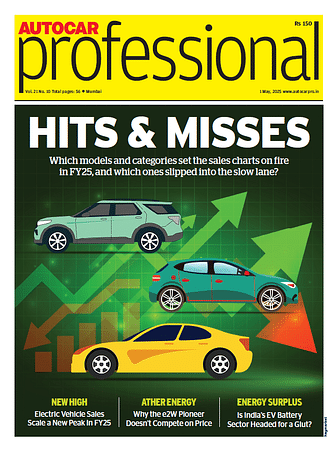Why Jaguar Land Rover lost £3.4billion
A headline-grabbing one-off charge shows how the British firm is paying the price for past mistakes, while also looking to the future
There is no way to sugarcoat Jaguar Land Rover’s latest set of financial results. In the final three months of 2018, balance sheets will record the company made a pre-tax loss of £3.4 billion (Rs 31,389 crore).
Granted, that eye-popping number is inflated by a one-off non-cash charge of £3.1 billion (Rs 28,619 crore). But even if you discount that as an ‘exceptional item’, it’s tough reading: a pre-tax loss of £273 million (Rs 2,520 crore), compared to £90m (Rs 831 crore) in the previous financial quarter.
Whichever figure you choose to focus on – £3.1bn or £273m – neither is positive. And both, in different ways, lay out the challenges Jaguar Land Rover faces in the coming years.
The one-off £3.1bn non-cash charge effectively comes from Jaguar Land Rover adjusting writing down the value of some of its capitalised investments, such as factories and machinery, effectively recognising that money it has previously invested in them won’t be recovered.
It is understood a number of those investments relate to investment in the production of diesel-engined cars, which have long made up the bulk of Jaguar Land Rover’s sales. That has left the company particularly vulnerable to the slump in demand for diesel which, whether right or wrong, increasingly seems an irreversible trend. By reducing the ‘carrying value’ of its capitalised investments, Jaguar Land Rover says it will save around £300 million (Rs 2,770 crore) annually in deprecation and amortisation.
Effectively, this is Jaguar Land Rover trying to draw a line under past mistakes by taking one big hit, preparing the firm to move forward under its ‘Charge’ and ‘Accelerate’ turnaround and transformation plans. Through those plans JLR is targeting more than £2.5 billion (Rs 23,080 crore) worth of savings, which we already know includes the loss of 4,500 jobs, this year.
Jaguar Land Rover is also investing in the future, in the three months investing £1 billion (Rs 9,232 crore), including funding for an engine manufacturing centre to build electric motors, and a battery assembly centre. Both will be located in the UK, and help its plans to offer an electrified version of every model in its line-up from 2020 on.
So it is possible to spot some positives, but the challenge the firm faces in staging a turnaround is highlighted by that £273 million (Rs 2,520 crore) pre-tax loss in the last quarter. For Jaguar Land Rover to stage a recovery, first it has to halt the decline.
Jaguar Land Rover says the primary reason for that £273m loss was “challenging market conditions” in China, where car sales have dropped sharply in the last year. JLR’s October-December sales in China of 22,100 cars was down 47.1 per cent year-on-year (compared to a market decline of 15.0%), enough to off-set strong – and above industry average – sales growth in the UK (up 18.4%) and North America (up 21.1%).
Again, it is possible to spot some positives here. Along with the E-Pace, Jaguar’s I-Pace electric SUV was one of the firm’s few models to increase its sales in the last quarter (Jaguar's saloons notably struggled). Although it is notable both those models are built under contract in Austria, so Jaguar’s margins will be lower on them.
The success of the I-Pace is well-deserved, given Jaguar beat the likes of Mercedes, BMW and Audi to the market with a premium SUV. But that raises questions: we know those firms are gearing up to launch vast ranges of EVs in the coming years. Publicly, at least, there are few signs of JLR following up the I-Pace. While electric cars still represent a small fraction of the car market, it is a clear growth area that Jaguar Land Rover could capitalise on, particularly in China.
That £3.4 billion hit is the latest in a string of painful actions – especially for those losing their job – Jaguar Land Rover has taken to pay for past mistakes. The next step is to find the right way forward. The new Range Rover Evoque should help, and the forthcoming Land Rover Defender will be key. Bolder actions may be required: Autocar UK has already revealed the firm is considering turning Jaguar into an electric-only brand. As of yet, that plan has not been signed off.
Still, Jaguar Land Rover’s recent actions have shown that company bosses are prepared to make difficult decisions in order to move forward. Which, even if it can’t sugarcoat a £3.4bn loss, is at least a potentially positive sign for the company’s future.
RELATED ARTICLES
Why Automotive Brands Need Intelligent Automated Customer Engagement
Agentic AI-driven engagement platforms help automotive brands streamline customer interactions, improve lead qualificati...
Charging Ahead: Aligning India's EV Growth with Free Trade Agreements
India’s EV policy is evolving to integrate climate goals, domestic manufacturing, and global trade strategies, with a fo...
Opinion: A Nissan-Maruti Hybrid Could Be on the Horizon
A Nissan e-POWER series hybrid in a Maruti sounds challenging but is a very interesting proposition.






 08 Feb 2019
08 Feb 2019
 31777 Views
31777 Views








 Sarthak Mahajan
Sarthak Mahajan



 Autocar India
Autocar India

